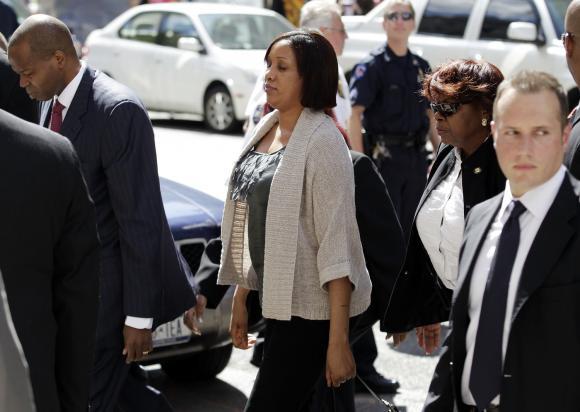View photo

0
1135
All charges against Dominique Strauss-Kahn dismissed
Nafissatou Diallo, the woman who has accused former IMF Chief Dominique Strauss-Kahn of sexual assault, walks into a meeting with the District Attorney at the 80 Centre Street in New York City on August 8, 2011. Prosecutors in the office of Cyrus R. Vance Jr., the Manhattan district attorney, have filed papers requesting that all charges be dropped against Kahn. UPI/John Angelillo
-----
Pros¬ecutors from the Manhattan dis¬trict attor¬ney’s office formally moved on Monday to dismiss the three-month-old sexual as¬sault case against Do¬m¬inique Strauss-Kahn, fil¬ing a 25-page motion that serves as their intricate and dev¬astating anato¬my of a case collaps¬ing.
The doc¬u¬ment laid out how pros¬ecutors went from char¬ac¬terizing Mr. Strauss-Kahn’s accus¬er as a cred¬ible woman whose account was “unwa¬vering” to one who was “persis¬tently, and at times inexplica¬bly, untruthful in de¬scrib¬ing mat¬ters of both great and small signif¬icance.” Because eventually pros¬ecutors could no longer be¬lieve her, they wrote, they could not ask a ju¬ry to do so.
Pros¬ecutors said they had accumulated enough ev¬idence to show that Mr. Strauss-Kahn, who was man¬aging di¬rector of the International Mon¬etary Fund at the time of his arrest, “en¬gaged in a hurried sexual encounter” with his accus¬er, a house¬keeper at the Sof¬i¬tel New York, a ho¬tel near Times Square.
Because none of the ev¬idence estab¬lished force or a lack of consent, the motion said, the case would hinge on the tes¬ti¬mo¬ny of the woman, Nafissatou Diallo.
Ms. Diallo’s account of what hap¬pened dur¬ing and af¬ter the al¬leged as¬sault began to devel¬op inconsis¬tencies, howev¬er. Even more trou¬bling to pros¬ecutors was what they said was a “pat-tern of untruthfulness” about her past.
That included a convinc¬ingly de¬liv¬ered story of be¬ing gang raped by sol¬diers in her native Guinea; she lat¬er acknowl¬edged that she had fab¬ricated the story, and pros¬ecutors char¬ac-terized her ability to recount a fictionalized sexual as¬sault with complete conviction as be¬ing “fa¬tal” to her cred¬ibility.
An¬oth¬er issue was that she had de¬nied that she was inter¬ested in making mon¬ey from the case, despite a recorded conver¬sa¬tion that pros¬ecutors said cap¬tured her discuss¬ing just that with her fiancé, a detai¬nee in an im¬migration jail in Arizona, short¬ly af¬ter the encounter in the ho¬tel.
The doc¬u¬ment, filed in State Supreme Court in Manhattan, asks Jus¬tice Michael J. Obus to dismiss the sev¬en-count
in¬dict¬ment against Mr. Strauss-Kahn. Jus¬tice Obus is expected to comply with the request on Tuesday.
The rec¬ommendation for dismissal also, in practical terms, ends a tu¬multuous relation¬ship be-tween the office of the dis¬trict attor¬ney, Cyrus R. Vance Jr., and Ms. Diallo, a 33-year-old im-migrant who said Mr. Strauss-Kahn, 62, attacked her when she went to clean his suite.
Her lawyer, Kenneth P. Thomp¬son, said the motion was “a hatch¬et job on Ms. Diallo’s cred-ibility.”
“The pros¬ecutors have ba¬sically adopted the defense argu¬ments,” he said. “They appear to bend over backwards to try to excuse their deci¬sion to run away from this case.”
Mr. Strauss-Kahn’s lawyers, William W. Taylor III and Benjam¬in Brafman, said in a state¬ment that they had maintained that their client was inno¬cent. “We also maintained that there were many reasons to be¬lieve that Mr. Strauss-Kahn’s accus¬er was not cred¬ible,” the state¬ment said. “Mr. Strauss-Kahn and his fam¬ily are grateful that the dis¬trict attor¬ney’s office took our concerns se¬riously and concluded on its own that this case cannot proceed fur¬ther.”
The pros¬ecutors’ trea¬tise on the case seemed meant for an au¬di¬ence be¬yond Jus¬tice Obus. The case has attracted worldwide at¬tention, largely because of Mr. Strauss-Kahn’s sta¬ture, as the lead¬er of the fund and the front-runner for the Socialist nom¬ination for French pres¬ident, and the lurid story line of a priv¬i¬leged man be¬ing accused of taking advantage of a ho¬tel house-keeper.
In laying out the circum¬stances in such detail, Mr. Vance also was giving a do¬mes¬tic au¬di¬ence, including Manhattan vot¬ers, an ex¬pla¬nation for his deci¬sion. He may also have sought to address crit¬icism from black leaders and women’s groups that he should proceed to trial.
In the doc¬u¬ment, pros¬ecutors say they do not nec¬essarily shy away from us¬ing as a witness some¬one who has lied or committed crimes in the past.
But they said “the na¬ture and number of the complainant’s false¬hoods leave us un¬able to cred-it her ver¬sion of events be¬yond a reasonable doubt, what¬ev¬er the truth may be about the encounter” at the ho¬tel.
“If we do not be¬lieve her be¬yond a reasonable doubt,” they added, “we cannot ask a ju¬ry to do so.”
Indeed, in a footnote, the as¬sistant dis¬trict attor¬neys han¬dling the case, Joan Illuzzi-Orbon and John McConnell, wrote that the motion explained the basis for their request that the charges be dismissed, but made no factual find¬ings.
“Rather,” they said, “we simply no longer have confidence be¬yond a reasonable doubt that the defen¬dant is guilty.”
The motion noted the lack of phys¬ical and med¬ical ev¬idence to support a claim of a forcible or nonconsensu¬al attack. Ms. Diallo and Mr. Strauss-Kahn did not have the oth¬er’s DNA under-neath their fin¬gernails; its pres¬ence could have support¬ed the notion of a struggle. Pros¬ecutors also said that present¬ing the case to a ju¬ry, despite their own growing
doubts, would vio¬late the custom in their office: that pros¬ecutors must them¬selves be convinced of a defen¬dant’s guilt before bring¬ing a case to trial.
Ms. Illuzzi-Orbon, Mr. McConnell and a third pros¬ecutor, Ann Prunty, met with Ms. Diallo and Mr. Thomp¬son on Monday af¬ter¬noon to inform them of the deci¬sion to drop the case. The meeting lasted 20 or 30 sec¬onds, and the pros¬ecutors accused her of lying but would not answer her questions, Mr. Thomp¬son said.
He im¬me¬diately held a news confer¬ence, saying Mr. Vance had de¬nied the right of a woman to get jus¬tice in a rape case.
Mr. Thomp¬son has filed a lawsuit for Ms. Diallo against Mr. Strauss-Kahn, seeking unspec¬i-fied dam¬ages. He also filed a motion on Monday seeking the ap¬point¬ment of a special pros-ecutor in the case.
Mr. Vance’s office has come under some crit¬icism for the deci¬sion short¬ly af¬ter Mr. Strauss-Kahn’s arrest on May 14 to reject an agree¬ment that would have freed him on bail and al-lowed them more time to inves¬tigate, and to learn more about Ms. Diallo, before bring¬ing an in¬dict¬ment.
While that more de¬lib¬erative course might have had the same ul¬ti¬mate result, it could have helped avoid the early pro¬nounce¬ments that she was cred¬ible and “unwa¬vering.”
The new motion shed no light on the bail deci¬sion.
Af¬ter the brief meeting be¬tween pros¬ecutors and the accus¬er’s team, a chaot¬ic scene unfold¬ed out¬side, with reporters
and onlookers mixing with rep¬resentatives from women’s groups and elected of¬ficials.
Sonia Osso¬rio, the exec¬utive di¬rector of the New York City chap¬ter of the National Orga¬ni-zation for Women, said Ms. Diallo had presented a complicated case that had been “mis¬han-dled by many people, including the victim’s lawyer.” But she said, “The prospect of Do¬m-inique Strauss-Kahn simply walking away scot-free is appalling.”
Re¬action in France to the news on Monday was mixed, with many ex¬press¬ing pleasure with Mr. Vance’s deci¬sion but noting that Mr. Strauss-Kahn’s rep¬u¬tation had been dam¬aged, especially among female vot¬ers.
Mr. Strauss-Kahn faces an¬oth¬er inves¬tigation in France. A writ¬er, Tristane Banon, claims he at¬tempted to rape her in 2003. French pros¬ecutors are inves¬tigating the charge.
Steven Erlanger con¬tributed reporting from Paris, and Jim Dwyer and Col¬in Moynihan from New York.
Source : The New York Times
PUB
Photos From This Album
PUB
Author
KHADHORMEDIA
Le Top des Tops Médias, KHADHOR' MEDIA, C'est Trop Top !
Le Top des Tops Médias, KHADHOR' MEDIA, C'est Trop Top !
Facebook
Recommend
Photo info






